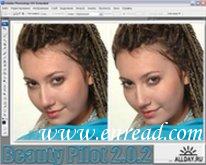| ||||||||||||||||||||||||||||||||||||||||
|
特拉维夫大学布拉瓦尼克电脑科学院教授丹尼尔•科亨—奥尔主持编写了一套“美容软件”,帮助爱美之人调整照片上的五官比例,在不改变面貌基本特征的基础上让面容变得更富有吸引力,在指导整形手术实施方面也有较大应用前景。这一软件可将照片中的普通人变得像杂志封面模特一般具有吸引力。
The goal is not just to toy with pictures. Sure, the new computer software could help editors distort magazine cover photos even more than they already do. But it could also guide plastic surgeons in efforts to achieve some perceived level of perfection in a patient. Or the software might even be incorporated into future digital cameras to make us all appear gorgeous, the researchers suggest. "Beauty, contrary to what most people think, is not simply in the eye of the beholder," said lead researcher Daniel Cohen-Or of the Blavatnik School of Computer Sciences at Tel Aviv University. Attractiveness - for men or women - can be objectified by a computer and boiled down to a function of mathematical distances or ratios, Cohen-Or said, admitting that the work is likely to be controversial. "Beauty can be quantified by mathematical measurements and ratios. It can be defined as average distances between features, which a majority of people agree are the most beautiful," he said. "I don't claim to know much about beauty. For us, every picture in this research project is just a collection of numbers." All this is actually backed by a study, published recently in the proceedings2 of Siggraph, an annual computer graphics3 conference. Cohen-Or and colleagues asked 68 Israeli and German men and women, ages 25 to 40, to rank the beauty of 93 different men's and women's faces on a scale of 1 to 7. The scores were entered into a database and correlated to 250 different measurements and facial features, such as ratios of the nose, chin and distance from ears to eyes, according to a statement from the team. From this, they created an algorithm of "desirable elements of attractiveness" that then spits out the new you. The beauty machine is more subtle than a typical Photoshop makeover, they say. The machine does not seem to work so well on celebrities4, however. "We've run the faces of people like Brigitte Bardot and Woody Allen through the machine and most people are very unhappy with the results," Cohen-Or said. "But in unfamiliar5 faces, most would agree the output is better." 点击  收听单词发音 收听单词发音
|
||||||||||||||||||||||||||||||||||||||||
上一篇:巴赫部分名曲为其妻子所作 下一篇:研究:午睡能够增强记忆力 |
||||||||||||||||||||||||||||||||||||||||
- 发表评论
-
- 最新评论 进入详细评论页>>




